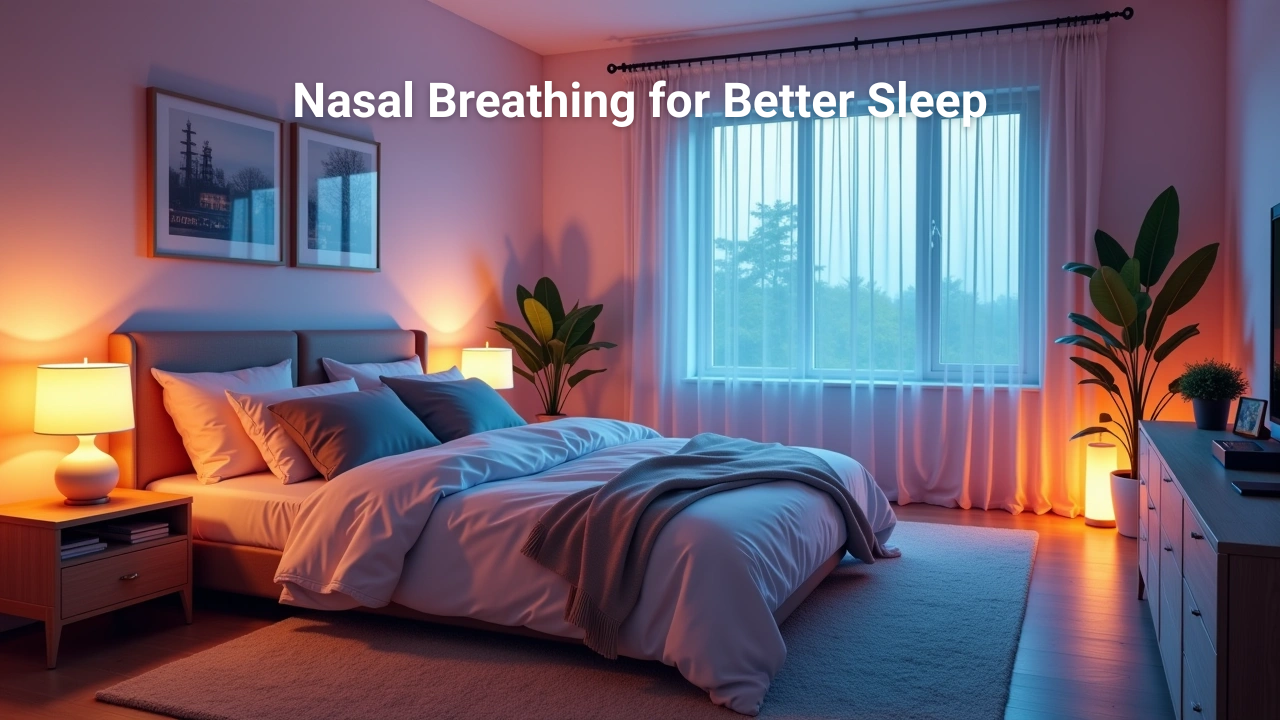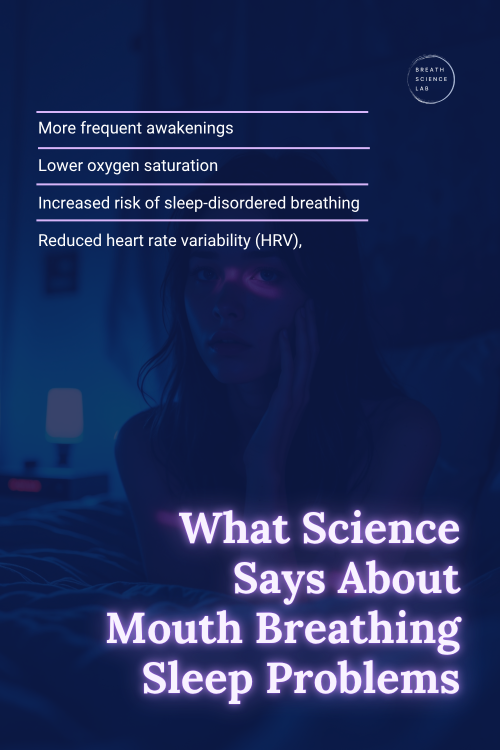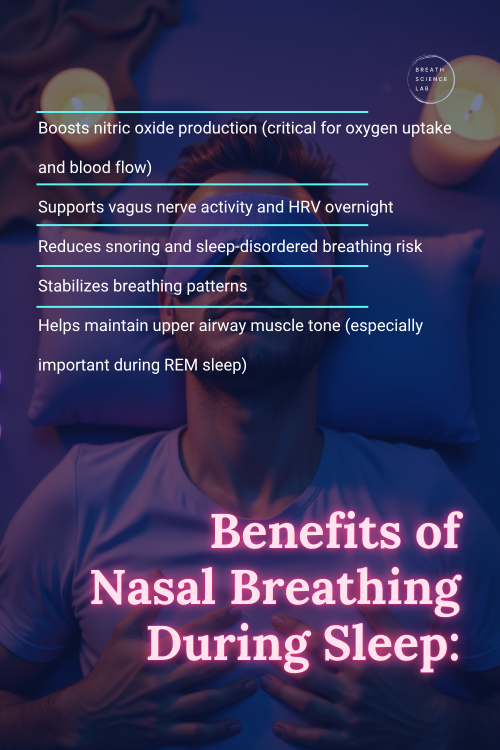Nasal Breathing for Better Sleep: Why Mouth Breathing Sabotages Your Recovery (and What Science Says to Do Instead)

Sleep is when your nervous system resets, your tissues repair, and your stress hormones finally downshift.
But here’s the part most people miss: The way you breathe at night directly affects how well your body recovers.
If you’re a chronic mouth breather during sleep - or experimenting with trends like mouth taping without knowing the risks - this post is for you.
Let’s check out the science, the risks, and the trauma-aware way to support your nervous system with better breathing at night.
The Problem with Mouth Breathing During Sleep
Mouth breathing during sleep isn’t just a bad habit.
It disrupts oxygen delivery, prevents nitric oxide production, and keeps your nervous system in a subtle state of threat.
What Science Says About Mouth Breathing Sleep Problems:
- More frequent awakenings
- Lower oxygen saturation
- Increased risk of sleep-disordered breathing (including sleep apnea)
- Reduced heart rate variability (HRV), a key marker of recovery and nervous system resilience (I follow it religiously)
For anyone with trauma, anxiety, or chronic stress, this is super important.
Poor sleep quality can make emotional regulation harder, increase your baseline anxiety, and leave you waking up already exhausted.
Related: Breathwork for Better Sleep →

Nasal Breathing: Why It Matters for Sleep Recovery
When you breathe through your nose, your body produces nasal nitric oxide. Nitric oxide is a naturally occurring molecule that improves oxygen delivery and supports parasympathetic activation.
Benefits of Nasal Breathing During Sleep:
✅ Boosts nitric oxide production (critical for oxygen uptake and blood flow)
✅ Supports vagus nerve activity and HRV overnight
✅ Reduces snoring and sleep-disordered breathing risk
✅ Stabilizes breathing patterns
✅ Helps maintain upper airway muscle tone (especially important during REM sleep)
And here’s something new from the research world:
A 2025 human brain study (Dlouhy et al., University of Iowa) found that our forebrain actually synchronizes with breathing rhythms - even during sleep.
Slow, nasal breathing can entrain brain regions involved in emotional regulation, memory consolidation, and vigilance against respiratory threats overnight.
Translation:
The way you breathe shapes your brainwaves while you sleep.

Should You Try Mouth Taping? Here’s What Science Actually Says
Mouth taping has exploded on social media as a quick fix for mouth breathing sleep problems.
But here’s the truth from the latest 2025 systematic review (Rhee et al., PLOS One):
- Only 2 out of 10 studies showed a small improvement in sleep apnea severity. In fact, it was only in people with mild sleep apnea and clear nasal airways.
- Most studies didn't include anyone with nasal obstruction.
- The researchers flagged potential risks, including asphyxiation, in people with any nasal blockage.
- The overall quality of the evidence was rated poor across studies.
For trauma-aware sleep support, this matters.
If you force the body into a restricted breathing pattern during sleep without first checking for nasal obstruction you could be doing serious harm to yourself. It can trigger panic responses, oxygen desaturation, and increased sympathetic nervous system activity.
A Quick Personal Note:
I’ll be honest - I’ve used mouth taping myself for a while now.
Not the full-mouth kind. I use a tiny vertical strip, right in the center, just enough to keep my jaw from dropping open.
I can still talk with it on (which sounds hilarious, by the way… my wife hates it and makes fun of me every time).
But… reading this latest research has me rethinking things.
I do have a chronically stuffy nose, and while I thought taping was helping, I’m realizing I need to address the nasal obstruction first before continuing.
A Safer, Science-Backed Way to Support Nasal Breathing for Sleep
If you’re struggling with mouth breathing at night, consider doing this:
1. Clear Your Nose Before Bed
A gentle saline spray or rinse can help reduce obstruction.
2. Practice Pre-Sleep Nasal Breathing
Spend 3-5 minutes in bed focusing on light, slow nasal-only breathing.
Try a 5-second inhale / 5-second exhale pattern.
3. Try Humming Before Sleep
Humming increases nasal nitric oxide production and helps open nasal passages.
A few minutes of soft humming can make a noticeable difference.
4. Optimize Sleep Position
Side-sleeping reduces airway collapse risk and supports better nasal breathing.
5. Get Evaluated for Nasal Obstruction
If you constantly feel stuffy (like me) - even during the day - consider seeing an ENT or sleep specialist before trying mouth taping.
Trauma-Aware Sleep Tip
If breathwork makes you anxious - or if your nervous system ramps up when you try to control your breath - don't do the tape thing.
Instead, focus on gentle, slow nasal inhales during your bedtime routine.
Safety and comfort come first. Always.
Want More Trauma-Safe Sleep Tools?
👉 Breathwork for Better Sleep: The 3-Minute Bedtime Reset →
👉 The Parasympathetic Reset →
If you’re curious about HRV and recovery tracking:
👉 Quick Vagus Nerve Hack: Why Boosting HRV Improves Your Decisions Fast →
References:

